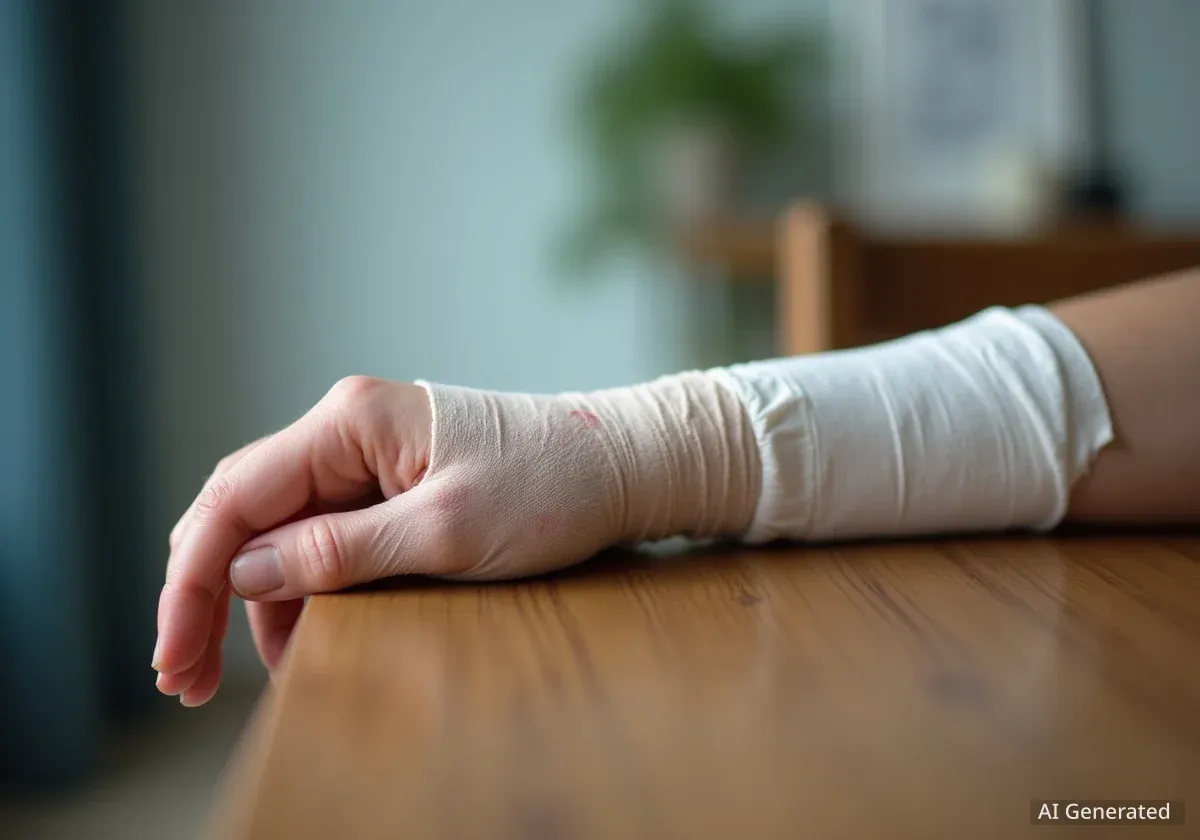Bern is seeing a significant increase in scabies infections since 2023. This parasitic skin condition has led to severe discomfort and social isolation for many residents, prompting local health authorities to issue new guidance. The rise in cases highlights a growing public health challenge in the region.
Key Takeaways
- Scabies infections have risen in Bern since 2023.
- A 27-year-old woman, Alessia, suffered from misdiagnosis and repeated infections.
- The disease causes intense itching and can lead to social isolation.
- The Bern health office published a guide for prevention and treatment.
- Dermatologists note a worldwide increase in scabies cases.
Personal Struggle with Scabies Infection
Alessia, 27, has battled the effects of scabies for over a year. Her journey began in late August 2024 when she first noticed a rash. A general practitioner initially misdiagnosed it as 'sand flea bites'. This incorrect diagnosis meant she suffered for four months with intense itching, especially at night, without proper treatment. Her condition worsened significantly during this period.
The constant itching caused severe physical and mental distress. "My whole body was burning," Alessia told 20 Minuten. The discomfort was so extreme that she sometimes slept in her bathtub. She also developed compulsive cleaning habits in an attempt to manage the infestation.
Scabies Fact
- Scabies is a skin infection caused by tiny mites.
- These mites burrow into the top layer of skin.
- The main symptom is intense itching, especially at night.
- It is highly contagious through direct skin-to-skin contact.
Public Health Response and Treatment Challenges
Since 2023, the Bern Health Office has received more reports of scabies infections. In response, authorities published an information sheet. This document details strict hygiene measures necessary for effective treatment and prevention. These measures are crucial for controlling the spread of the mites.
Once Alessia received the correct diagnosis, her treatment involved applying a cream to her entire body and taking oral medication. She also had to wash all clothes and bedding at 60 degrees Celsius. After washing, items needed to be stored in airtight bags for several days. This rigorous process was vital to eliminate the mites and their eggs.
During her therapy, physical contact was not allowed. This significantly affected Alessia's social life. "I became more and more socially isolated," she explained. The psychological burden of the disease was substantial. "I thought something was wrong with me," she said, reflecting on the distress caused by the prolonged illness.
Understanding Scabies
Scabies, also known as 'skabies,' is a parasitic skin infection. It is caused by a specific type of mite. This condition is contagious and occurs globally. It thrives in environments where people live closely together. The parasite lives on and in human skin. It spreads through close body contact. Infected areas itch intensely, especially at night. This can lead to severe skin symptoms and sleep problems for those affected.
Expert Insights on Rising Scabies Cases
Dermatologist Maria von Eichborn noted that diagnosing scabies can be difficult. "The diagnosis is not easy," she told 20 Minuten. Scabies can be mistaken for other skin conditions. Typical signs, such as tiny burrows in the skin, are sometimes only visible under a microscope. Intense itching is also not a clear indicator, as many conditions can cause it. This makes early and accurate diagnosis challenging.
Dr. von Eichborn reported that many patients suffer psychologically from scabies. The uncertainty of whether one is still contagious is particularly hard to bear. "It is an enormous burden. Women often report feeling unclean," she added. Family tensions also frequently arise when not everyone follows the treatment plan strictly. "If one person does not complete the therapy consistently, everyone has to start over again."
"Worldwide, we observe a significant increase, also in Europe, especially since the beginning of refugee flows about ten years ago."
– Dr. Maria von Eichborn, Dermatologist
According to Dr. von Eichborn, scabies is no longer a rare condition. She observed a clear global increase, including in Europe. This rise has been particularly noticeable since the start of refugee movements about ten years ago. The issue was discussed at the recent international congress in Paris. Countries like Norway maintain detailed registers of infection numbers, which also show a clear increase.
Repeated Infections and Social Impact
Despite completing treatment, Alessia became reinfected. In early March 2025, she visited a dermatologist again. The doctor confirmed a new infection. This time, seven people in her social circle were also affected. The therapy had to restart for everyone involved. This situation led to significant tensions in her friendships, with several relationships ending.
The incubation period for scabies is 10 to 12 days. This means an infection can go unnoticed at first. During this time, other people can become infected without anyone knowing. This hidden spread makes it harder to control outbreaks. It also adds to the stress for those affected and their close contacts.
Risk Factors and Community Settings
Scabies infections are particularly common in places where many people live in close quarters. These environments include families, daycares, schools, nursing homes, and asylum centers. The Bern Health Office reported some cases in asylum centers. However, they could not confirm if cases occur more frequently there than in other facilities. The close proximity in such settings makes transmission easier.
Effective prevention and control require community-wide effort. Adherence to strict hygiene protocols is essential. Public health campaigns can help raise awareness. Early diagnosis and consistent treatment are key to reducing the spread of scabies. This is important for protecting public health in Bern and beyond.
The ongoing challenge of scabies underscores the need for continued vigilance. It also highlights the importance of clear communication from health authorities. Public education and accessible resources are vital for individuals to protect themselves and their communities from this persistent parasitic infection.
The Bern Health Office continues to monitor the situation closely. They aim to provide updated guidelines as needed. Community cooperation remains a cornerstone of managing and ultimately reducing scabies cases in the canton.




